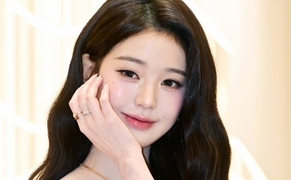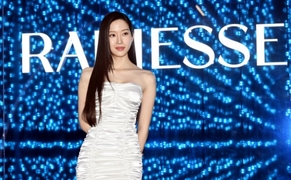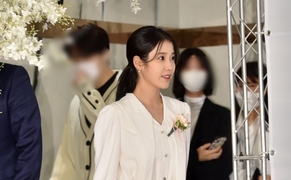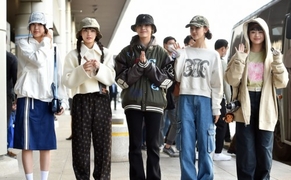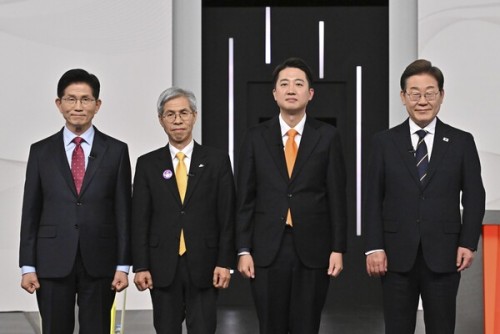 |
| From right, presidential candidates Lee Jae-myung of the Democratic Party, Lee Jun-seok of the New Reform Party, Kwon Young-guk of the Democratic Labor Party, and Kim Moon-soo of the People Power Party pose for a commemorative photo ahead of the first presidential debate at the SBS Prism Center studio in Sangam-dong, Mapo District, Seoul, on May 18. / Source: Yonhap News |
The first of three televised presidential debates kicked off on May 18 with a focus on the economy. The upcoming debates, scheduled for May 23 and 27, will address social and political issues, respectively. Given the compressed timeline of this early election, this initial debate offered one of the few chances for voters to assess the candidates' economic visions.
Despite its significance, the two-hour debate—featuring four candidates, Lee Jae-myung (Democratic Party), Kim Moon-soo (People Power Party), Lee Jun-seok (New Reform Party), and Kwon Young-guk (Democratic Labor Party)—left limited room for detailed policy comparison. Nonetheless, it successfully exposed key differences in economic perspectives.
Economic issues remain the top concern for voters. A recent example underscoring the public's sensitivity came from Lee Jae-myung’s campaign stop in Gunsan. There, he sparked backlash by saying, “Even after sweating over boiling chicken for an hour and earning 50,000 won, only 30,000 won remains. Meanwhile, a cup of coffee sells for 8,000 to 10,000 won, and its cost, from what I found, is just 120 won.” When rival Kim Moon-soo questioned him during the debate about whether he still believes coffee costs 120 won to make, Lee sidestepped the question, saying the remark was taken out of context.
To help voters better assess economic platforms, it would be valuable to have separate, in-depth policy debates between each candidate's economic advisors. Even within this limited debate, several distinctions were clear. Kim Moon-soo and Lee Jun-seok advocated structural reforms—such as deregulation and productivity improvements—as essential to revitalizing the Korean economy. Lee Jae-myung, on the other hand, continued to favor fiscal stimulus despite rising deficits, which international institutions have flagged as concerning. Kwon Young-guk pushed for stronger redistribution policies.
Policies that contradict economic fundamentals are unlikely to succeed. It's in this context that discussions about discarding “toxic pledges” after election victory often arise. Judged by economic coherence, Kim Moon-soo and Lee Jun-seok’s reform-oriented stances fared better than Lee Jae-myung and Kwon Young-guk’s deficit-financing and redistribution-heavy proposals. Fiscal deficits, after all, tend to drive up interest rates or inflation, both of which weigh heavily on households.
Lee Jae-myung defended his deficit policy using a “hotel settlement” metaphor during his rally in Gunsan. He explained: “A traveler pays a hotel deposit of 100,000 won. The hotel owner uses it to pay a furniture store, the furniture store pays the chicken shop, the chicken shop pays the stationery store, and the stationery store repays the hotel. In the end, the traveler gets a refund and leaves, but the money circulated—that is economics.”
Lee Jun-seok criticized the metaphor, saying, “If that worked, local governments could just max out corporate cards on steak and fruit, cancel the payments later, and claim the economy benefited.” He was essentially referencing economist Frédéric Bastiat’s famous “broken window fallacy.” Lee Jae-myung dismissed it as an “extreme example” but failed to mount a substantive rebuttal.
The candidates also clashed over how to realize their shared ambition of building an AI powerhouse. Kim Moon-soo and Lee Jun-seok emphasized the need for cheap and stable electricity, pledging to raise the share of nuclear power. Lee Jae-myung, by contrast, supported a policy focused on costly renewable energy while opposing new nuclear power plants—yet he offered no clear solution for ensuring affordable energy supply.
On international trade and tariffs, divergent views emerged again. Kim Moon-soo and Lee Jun-seok argued that strong U.S.-Korea ties are essential, not just for security but also to navigate current trade tensions. Kim raised suspicions about Lee Jae-myung’s knowledge of a former deputy governor’s illicit remittances to North Korea, while Lee Jun-seok challenged Lee’s perceived pro-China, anti-U.S. stance. Lee Jae-myung reaffirmed his commitment to the U.S.-Korea alliance but also stressed the importance of maintaining good relations with China and Russia.
While the debate did not allow for deep dives into economic specifics, it provided voters with a snapshot of how the candidates view key issues. As the campaign continues, further policy vetting—whether through advisor debates, expert evaluations, or detailed briefings—will be crucial for voters to identify a president who combines vision with competence and a commitment to public service over self-interest.
Most Read
-
1
-
2
-
3
-
4
-
5
-
6
-
7

















